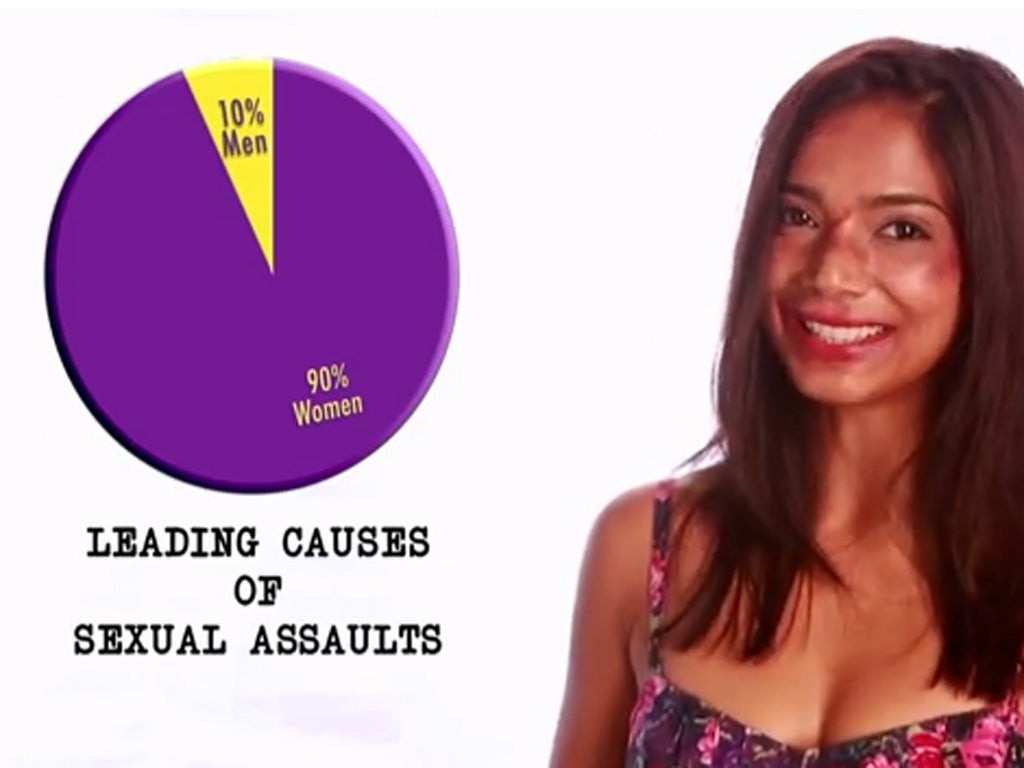India's parody rape ‘it's your fault’ video sends a message to us all about the ways victims are blamed
The uncomfortable truth is that we still find similar attitudes towards rape in the West with disturbing regularity

Your support helps us to tell the story
From reproductive rights to climate change to Big Tech, The Independent is on the ground when the story is developing. Whether it's investigating the financials of Elon Musk's pro-Trump PAC or producing our latest documentary, 'The A Word', which shines a light on the American women fighting for reproductive rights, we know how important it is to parse out the facts from the messaging.
At such a critical moment in US history, we need reporters on the ground. Your donation allows us to keep sending journalists to speak to both sides of the story.
The Independent is trusted by Americans across the entire political spectrum. And unlike many other quality news outlets, we choose not to lock Americans out of our reporting and analysis with paywalls. We believe quality journalism should be available to everyone, paid for by those who can afford it.
Your support makes all the difference.A video mocking attitudes towards rape in India has gone viral, suggesting that whilst we may not find rape jokes funny, we can still laugh at the lampooning of patriarchal explanations of the crime.
Fronted by Bollywood actress Kalki Koechlin as part of the comedy group All India Backods, for my money this parody of India’s “victim blaming” culture is a clever and affecting weapon in the battle against sexual violence, not just in India, but across the world. Here in the UK, we are hardly uninitiated in the ancient art of victim blaming, in a year where rape and sexual abuse have remained stubbornly high on both the domestic and foreign news agendas.
We may have looked on in horror when the news broke that a 23-year-old student had died following a brutal gang rape on a Delhi bus last December, then breathed a sigh of relief because that sort of barbaric thing couldn’t possibly happen here . But – guess what - weeks later, a fourteen-year-old girl was allegedly raped by two men on a bus in Glasgow. The child didn’t die, thank goodness, and there was no rioting in the streets in the aftermath, but as much as we’d like to think rape and sexual abuse are greater problems in the third world than in the first, the statistics do not categorically bear this out. We may sneer at the “backward” attitudes of the developing world towards rape victims, but how far behind western attitudes are they in reality? Thirty years? Twenty? Less? The uncomfortable truth is that we still find similar attitudes towards rape in the West with disturbing regularity.
In the past week, US defence lawyers spent no less than 30 hours interrogating an alleged Navy Academy gang rape victim, asking her – amongst other things – whether she was wearing underwear the night of the alleged attack, as though the type of underwear one does (or does not) sport is a reliable indicator of one’s sexual intentions. Interestingly, one of Mumbai’s proposed solutions to the perceived rape crisis is to ban the display of lingerie in storefronts – because that’ll stop men doing rape, won’t it? It was Agent Provocateur that provoked him, your honour (other brands of lingerie are available – and equally culpable).
Here in the UK, although it is no longer permissible to ask an alleged victim about their sexual history in court, the judicial process has not evolved past victim blaming. Nowhere is this better illustrated than the recent tragic case of Francis Andrade, the musician who killed herself six days after an aggressive cross-examination at the trial of her abuser. Meanwhile, a British judge excelled himself on the victim blame-game front by labelling a thirteen-year-old girl a “sexual predator”. The image of the “ideal” rape victim is pervasive in both the first and the developing world. She is young, middle-class, respectable and sexually inexperienced – preferably a virgin. In the West, she is white. She isn’t drunk or hanging out with the wrong people – just ask Serena Williams, who was forced to apologise following ill-judged remarks about a rape victim. The ideal victim is a “good girl” and hers was a “legitimate rape”, to quote the infamous words of former US Congressman Todd Aikin.
The assertion that “wearing skirts” leads to rape is not just the laughably backward notion of “other” cultures either. From Canada, this photo – entitled “Judgement” – went viral last year, illustrating how many westerners are aware of the equivocation between skirt length and morality, even if they oppose this attitude themselves.
A new case of rape is reported in India every twenty minutes – a truly shocking statistic. Rape cases there have doubled in the past 20 years, but we do not know if this is chiefly due to increased reporting of the crime. In the UK, the Office for National Statistics estimates that 85,000 women are raped in England and Wales each year – which works out at nearly ten women per hour, although the majority do not report their assault. Of course, it is difficult to compare statistics from different countries in any meaningful way, but a thriving “rape culture” is not just a problem for the developing world to overcome. Before we pass judgement on India, perhaps we should bear in mind Ghandi’s famous alleged reply when asked what he thought of western civilisation – “I think it would be a good idea.”
Join our commenting forum
Join thought-provoking conversations, follow other Independent readers and see their replies
Comments